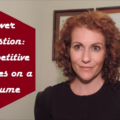Job fairs are a great way to maximize your exposure to a wide variety and a large number of potential employers. This is true for both campus job fairs for students, and job fairs aimed at experienced professionals.
Job Fair Tips
Job fairs can be overwhelming, but there is a method for optimizing your time and for making a great first impression:
- Pre-Register – even in cases where it is not mandatory to pre-register, I recommend you do. Typically, you will have the opportunity to share your resume with employer attendees, providing you with exposure even before attending the fair.
- Review & Research Employers – before you attend the job fair, do your homework. Most job fairs will make the list of employer attendees available to job seekers. Be sure to take the time to research each employer and be sure to review their career site. In doing so, you will be better able to articulate how your skills will match their needs.
- Rank the Employers – it is not necessary to meet with every employer at a job fair. After reviewing and researching the list of employer attendees, make note of the A (definitely want to meet), B (would be interested in meeting), and C (not interested in meeting) companies. If there is a map of the employer booths, you can strategize the best path for seeing your A and B list companies.
- Bring Resumes & Business Cards – you should bring copies of your resume in case the employer(s) ask for one. In the case that an employer is not accepting hard copy resumes, consider printing out personalized business cards. This way the employer will have your contact information at the ready.
- Dress for Success – think of meeting employers at a job fair like a mini job interview. As such, you should dress accordingly. Keep in mind, however, that you could be on your feet for an extended period of time. Be sure to wear comfortable shoes.
- Prepare Questions – if you have done your research, you shouldn’t need to ask the employer what the company does. Having great questions that are specific to the employer is a great way to stand out among the other job seekers.
- Body Language is Key – your body language is a key contributor of an employer’s first impression of you. As such, try not to fidget or chew gum, be sure to maintain eye contact, and have a firm handshake.
- Elevator Pitch – an elevator pitch is your 30-60 second sound bite on your skills, experience, and passion points. It’s a summary of how you can fill the needs of an employer.
- Don’t be a Time Hog – speaking as someone who has been a recruiter representing an organization at job fairs, it is difficult to deal with those job seekers who fire off a barrage of questions. Not only is this frustrating to the other job seekers who are in line to speak with the recruiter, but it also doesn’t leave a good first impression. Be sure to ask questions, but be aware of your surroundings.
Final Thoughts
Job fairs are like speed dating, but for jobs. You have the opportunity to meet with a number of employers in one venue. As such, it is important to keep track of the employers with whom you have met and any information they may have shared with you. After the job fair, follow up with the employers of interest via email. Make mention of any conversation points you shared and express your continued interest in the organization. As a result, this could lead to a formal interview and potentially, your next job!
I hope you found this post helpful. If you have any additional insights, or would like to share your experience, I’d love to hear from you.
Until next time, happy hunting!








